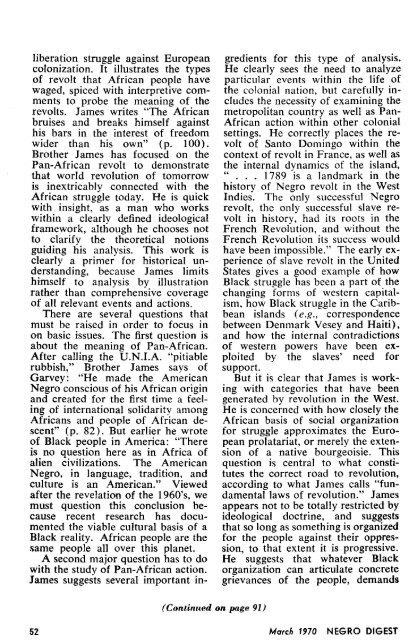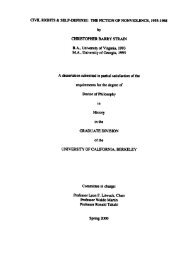Negro Digest - Freedom Archives
Negro Digest - Freedom Archives
Negro Digest - Freedom Archives
Create successful ePaper yourself
Turn your PDF publications into a flip-book with our unique Google optimized e-Paper software.
liberation struggle against European<br />
colonization . It illustrates the types<br />
of revolt that African people have<br />
waged, spiced with interpretive comments<br />
to probe the meaning of the<br />
revolts . James writes "The African<br />
bruises and breaks himself against<br />
his bars in the interest of freedom<br />
wider than his own" (p . 100) .<br />
Brother James has focused on the<br />
Pan-African revolt to demonstrate<br />
that world revolution of tomorrow<br />
is inextricably connected with the<br />
African struggle today . He is quick<br />
with insight, as a man who works<br />
within a clearly defined ideological<br />
framework, although he chooses not<br />
to clarify the theoretical notions<br />
guiding his analysis. This work is<br />
clearly a primer for historical understanding,<br />
because James limits<br />
himself to analysis by illustration<br />
rather than comprehensive coverage<br />
of all relevant events and actions .<br />
There are several questions that<br />
must be raised in order to focus in<br />
on basic issues . The first question is<br />
about the meaning of Pan-African .<br />
After calling the U.N.LA . "pitiable<br />
rubbish," Brother James says of<br />
Garvey : "He made the American<br />
<strong>Negro</strong> conscious of his African origin<br />
and created for the first time a feeling<br />
of international solidarity among<br />
Africans and people of African descent"<br />
(p . 82) . But earlier he wrote<br />
of Black people in America : "There<br />
is no question here as in Africa of<br />
alien civilizations . The American<br />
<strong>Negro</strong>, in language, tradition, and<br />
culture is an American ." Viewed<br />
after the revelation of the 1960's, we<br />
must question this conclusion because<br />
recent research has documented<br />
the viable cultural basis of a<br />
Black reality . African people are the<br />
same people all over this planet .<br />
A second major question has to do<br />
with the study of Pan-African action .<br />
James suggests several important in-<br />
52<br />
(Continued on page 911<br />
gredients for this type of analysis.<br />
He clearly sees the need to analyze<br />
particular events within the life of<br />
the colonial nation, but carefully includes<br />
the necessity of examining the<br />
metropolitan country as well as Pan-<br />
African action within other colonial<br />
settings . He correctly places the revolt<br />
of Santo Domingo within the<br />
context of revolt in France, as well as<br />
the internal dynamics of the island,<br />
" . . 1789 is a landmark in the<br />
history of <strong>Negro</strong> revolt in the West<br />
Indies . The only successful <strong>Negro</strong><br />
revolt, the only successful slave revolt<br />
in history, had its roots in the<br />
French Revolution, and without the<br />
French Revolution its success would<br />
have been impossible ." The early experience<br />
of slave revolt in the United<br />
States gives a good example of how<br />
Black struggle has been a part of the<br />
changing forms of western capitalism,<br />
how Black struggle in the Caribbean<br />
islands (e .g ., correspondence<br />
between Denmark Vesey and Haiti),<br />
and how the internal contradictions<br />
of western powers have been exploited<br />
by the slaves' need for<br />
support .<br />
But it is clear that James is working<br />
with categories that have been<br />
generated by revolution in the West .<br />
He is concerned with how closely the<br />
African basis of social organization<br />
for struggle approximates the European<br />
prolatariat, or merely the extension<br />
of a native bourgeoisie . This<br />
question is central to what constitutes<br />
the correct road to revolution,<br />
according to what James calls "fundamental<br />
laws of revolution ." James<br />
appears not to be totally restricted by<br />
ideological doctrine, and suggests<br />
that so long as something is organized<br />
for the people against their oppression,<br />
to that extent it is progressive .<br />
He suggests that whatever Black<br />
organization can articulate concrete<br />
grievances of the people, demands<br />
March 1970 NEGRO DIGEST
















